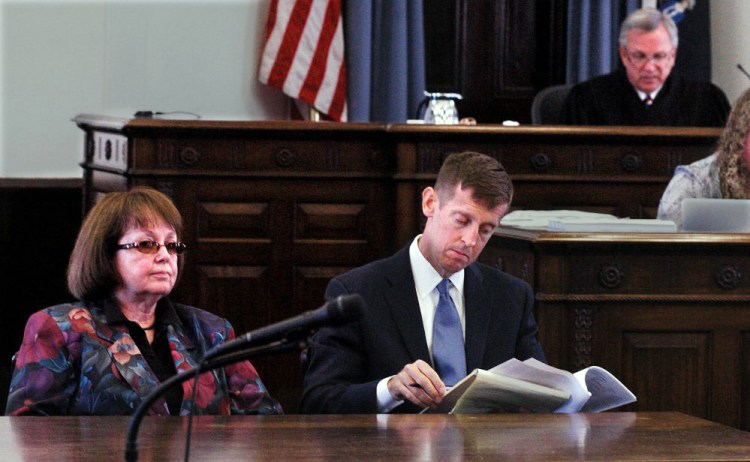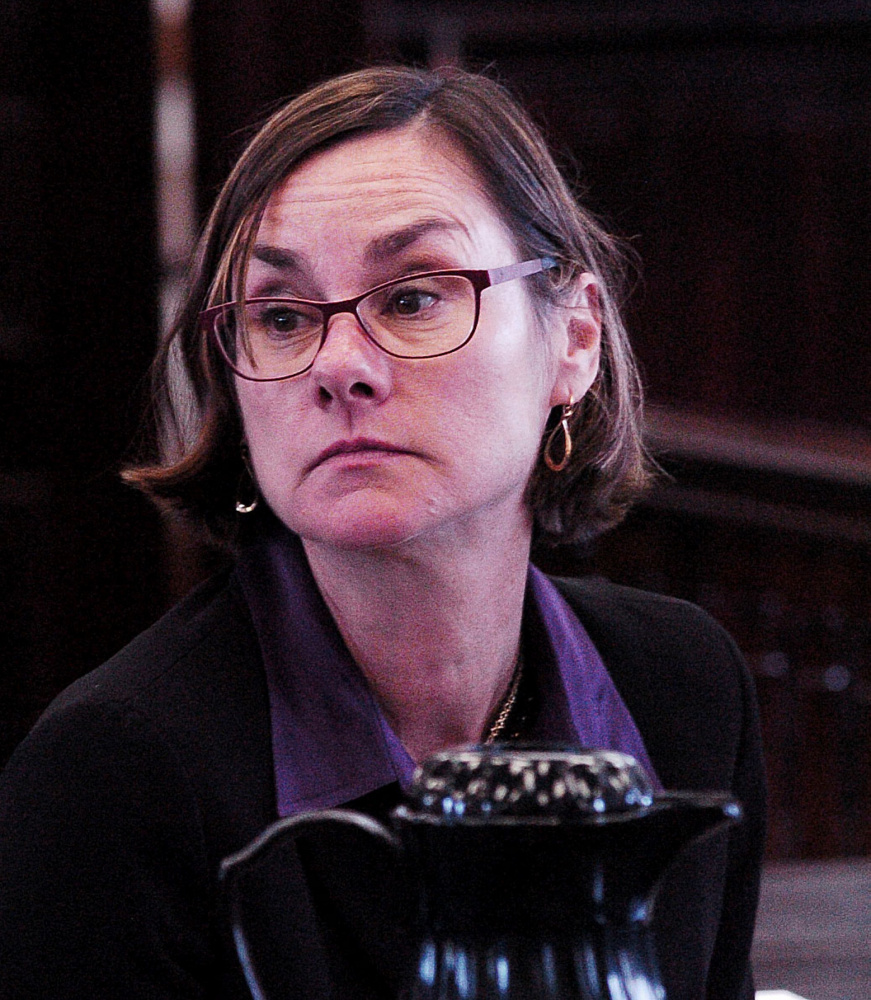SKOWHEGAN — The state attorney general’s office has never said how much money it believes Claudia Viles took from the Anson Town Office while she was tax collector for the town, but that figure will be revealed at Viles’ trial, which begins Monday, the prosecutor said Wednesday.
A jury of seven women and eight men will hear the case against Viles, 66, who is facing 13 charges, including class B theft, a felony for theft of more than $10,000. She is charged with taking the money from the Town Office in the period from 2009 to 2014, according to an indictment handed down from a Somerset County grand jury in September.
Officials with the attorney general’s office have not said how much they think Viles took, but Assistant Attorney General Leanne Robbin, who is prosecuting the case, has called it a “significant amount.” A civil lawsuit filed by the town of Anson and supported by copies of an auditor’s report says that from 2011 to September 2014 Viles misappropriated $438,712 in excise tax money paid by residents.
Robbin declined to comment when asked Wednesday to provide a figure for the amount the state is alleging Viles took, but said the figure will be presented at trial. The state’s charges against Viles go back to 2009, two years longer than the period in the town’s civil suit.
The town’s missing money figure for slightly less than four years is supported by town records, copies of auditor’s reports and a police affidavit filed in connection with a search warrant executed on Viles’ property last year.
The trial is scheduled to begin at 9 a.m. Monday in Somerset County Superior Court. Viles appeared in court with her attorney, Walter McKee, for Wednesday’s jury selection.
Superior Court Justice Robert Mullen, who will preside over the trial, asked the jury pool several questions, including whether they had knowledge of the case, whether any member of the jury pool had ever worked in law enforcement and whether any nonresidents of Anson had ever registered a vehicle in the town.
Most of the questions could be answered with one- or two-word answers, though some prospective jurors offered longer explanations to Mullen’s questions of whether they might be able evaluate the information in a fair and unbiased manner.
“I would have a hard time saying she’s guilty, yes,” said one woman, who said she had known Viles since high school. The woman was not selected for the jury.
Viles resigned Sept. 10 after she was charged with 13 counts, including the felony theft charge and misdemeanors including five counts of failure to make or file state income tax returns, six counts of failure to file or pay state income taxes and tampering with public records.
She has pleaded not guilty to each charge, a stance that her attorney said Wednesday she continues to maintain. “We’re ready for the trial to begin after many months of waiting,” McKee said Wednesday.
Class B theft is the highest theft charge possible in Maine and includes all thefts of more than $10,000. The state does not differentiate between higher amounts in bringing up charges, although the amount of money can play a role in sentencing.
While the amount the town has cited in its civil suit is for 2011 to September 2014, the Anson Board of Selectmen voted in September to have the town’s 2010 tax records audited and checked as well, though the records were missing from the Town Office and officials could not say where they were.
Chairman of the Board of Selectmen Arnold Luce would not comment on the case Wednesday and would not say whether the town ever was able to review records from 2010 or earlier years. “It’ll come out in the trial, I’m sure,” Luce said. “I feel it’s too close (to the trial) to be commenting.”
There is a six-year statute of limitations on the theft charge. Luce has said in the past that he was not sure whether the board would pursue reviews of records from before 2010 because of the expense of conducting an audit and uncertainly over whether the town would be able to recover the money. The town already recovered $250,000 in insurance money last year — the maximum allowable under its policy — after filing a claim alleging employee wrongdoing.
Viles was the elected tax collector in Anson for 42 years before she resigned, and town officials had said before that they do not know how far back money has been missing from the office. After the investigation into the missing excise tax money was launched in January 2015, the amount of money collected by the town in 2015 was $144,000 higher than in 2014.
The money’s disappearance was first noted in December 2014, when Triss Smith, the town’s administrative assistant at the time, found a $78,645 discrepancy between the amount of money Viles had reported collecting in 2014 and the amount that actually was collected, according to a police affidavit in the case.
Smith, who started working for the town in May 2014, had implemented a computer system that went online in September that year that automatically credited payments, and the town also began making daily deposits of the money it took in. Before that, Viles would deposit money on no set schedule, and Smith said many residents paid in cash because Viles held on to checks for a long time.
In January 2015, the town contacted Purdy Powers to perform an audit, which confirmed that $76,686 was missing from the 2014 town accounts.
A review in March 2015 of how Viles processed excise tax payments revealed that she wasn’t recording the right amounts, even though she appeared to understand how to do the job correctly, according to the affidavit. Luce also said that previous audits hadn’t revealed any mistakes or missing money, but he believes that auditors were given false numbers.
In April 2015, police seized $58,500 in cash from a safe in Viles’ garage, money that she and her lawyer, McKee, said is hers. They filed a motion in superior court asking that the money be returned, but the motion was withdrawn in August shortly after the town filed its civil lawsuit.
The lawsuit, filed in August, accuses Viles of purposely omitting amounts she collected in excise tax from the town’s accounting system, knowingly recording inaccurate amounts she collected in excise tax and reprinting calculator tapes with altered figures to make it appear that the amount of money collected matched what was being deposited.
Rachel Ohm — 612-2368
Twitter: @rachel_ohm
Send questions/comments to the editors.





Comments are no longer available on this story